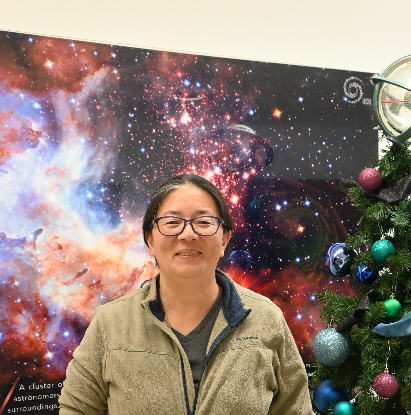The Department has 37 faculty engaged in research programs in
- Condensed Matter Physics
- Nanoscale Materials and Electronic Device Physics
- Biophysics
- High-Energy Physics
- Relativistic Heavy Ion Physics
- Astrophysics and Extra-galactic Astronomy and Cosmology.
These programs use facilities located on the campus and at national and international laboratories. The Department also has one research-active emeritus professor and five adjunct, visiting or cooperating faculty. The Department plays a significant role in interdisciplinary research and graduate training initiatives on campus in the areas of Nanoscience and Engineering, Environmental Physics, Biophysics, and Geophysics and Planetary Physics.
The integration of astrophysics and astronomy with physics is increasingly important in our discipline, particularly the physics of the Early Universe from both astronomical cosmology and particle physics. In 2006 we changed our department name from Physics to Physics and Astronomy. In the next few years, we plan to hire additional faculty primarily in the areas of nanoscale physics, astrophysics, and biophysics. The faculty and their research and educational mission are supported by a strong cohort of administrative and technical staff.
The Department has almost 200 undergraduate majors, each with an assigned faculty advisor as well as a departmental Student Affairs Officer. Our majors enjoy an extremely favorable undergraduate student/faculty ratio and nearly 80% of our graduating seniors have participated in undergraduate research at UCR. Our undergraduate degree options include a standard physics track which is often taken with a minor or dual major in mathematics and a biophysics track which can be used to simultaneously fulfill medical school prerequisites. A physics education track which can lead to combined degrees/certification in physics and education and an astrophysics track are new additions to our program. Undergraduates can also pursue a minor degree in Physics in combination with any other major on campus.
The Department has over 100 graduate students engaged in advanced study and research. The faculty, in combination with postdoctoral and professional researchers, provide an exceptional graduate training environment. The Department offers several graduate tracks leading to Ph.D.'s in Physics or Astronomy, with emphasis in Nuclear and Particle Physics, Condensed Matter, Surface, Optical Physics and Biophysics, Cosmology and Astroparticle Physics, and Environmental Physics.
Information on admission procedures and our courses can be found on the Undergraduate and Graduate programs pages which are linked to the Student Information page of this website. For more information about the Department, please contact:
- Chair, Professor Shan-Wen Tsai
- Vice-Chair, Associate Professor Igor Barsukov
- Co Vice-Chair, Associate Professor Yongtao Cui
- Co Vice-Chair, Professor Hai-Bo Yu
- Graduate Admissions Advisor, Yongtao Cui
- Undergraduate Advisor, Associate Professor Anson D'aloisio
- Student Affairs Officer, Derek Beving
To visit us, please contact the Physics Department Student Affairs Office by phone at 951-827-5332 or fax at 951-827-4529.
Welcome from the Chair, Professor Shan-Wen Tsai
The Physics and Astronomy Department’s core missions are to maintain a program of excellence in research by world-class scientists, to provide outstanding teaching and mentoring at the undergraduate and graduate level for our students, and to engage with the local community.
Our research addresses the deepest scientific questions ranging from understanding the most fundamental interactions in nature to the structure of the universe. Our faculty have on-campus laboratories with state-of-the-art equipment performing studies of atomic and molecular physics, biological systems, and emergent properties of novel quantum materials. We support and utilize some of the most advanced scientific facilities in the world, including the James Webb Space Telescope, the LIGO gravitational wave detectors, and accelerator-based particle and nuclear physics experiments at CERN, Brookhaven National Laboratory, and Jefferson Lab.
Our thriving research program provides many opportunities for our students to learn and become inspired by directly engaging in research with our faculty.


